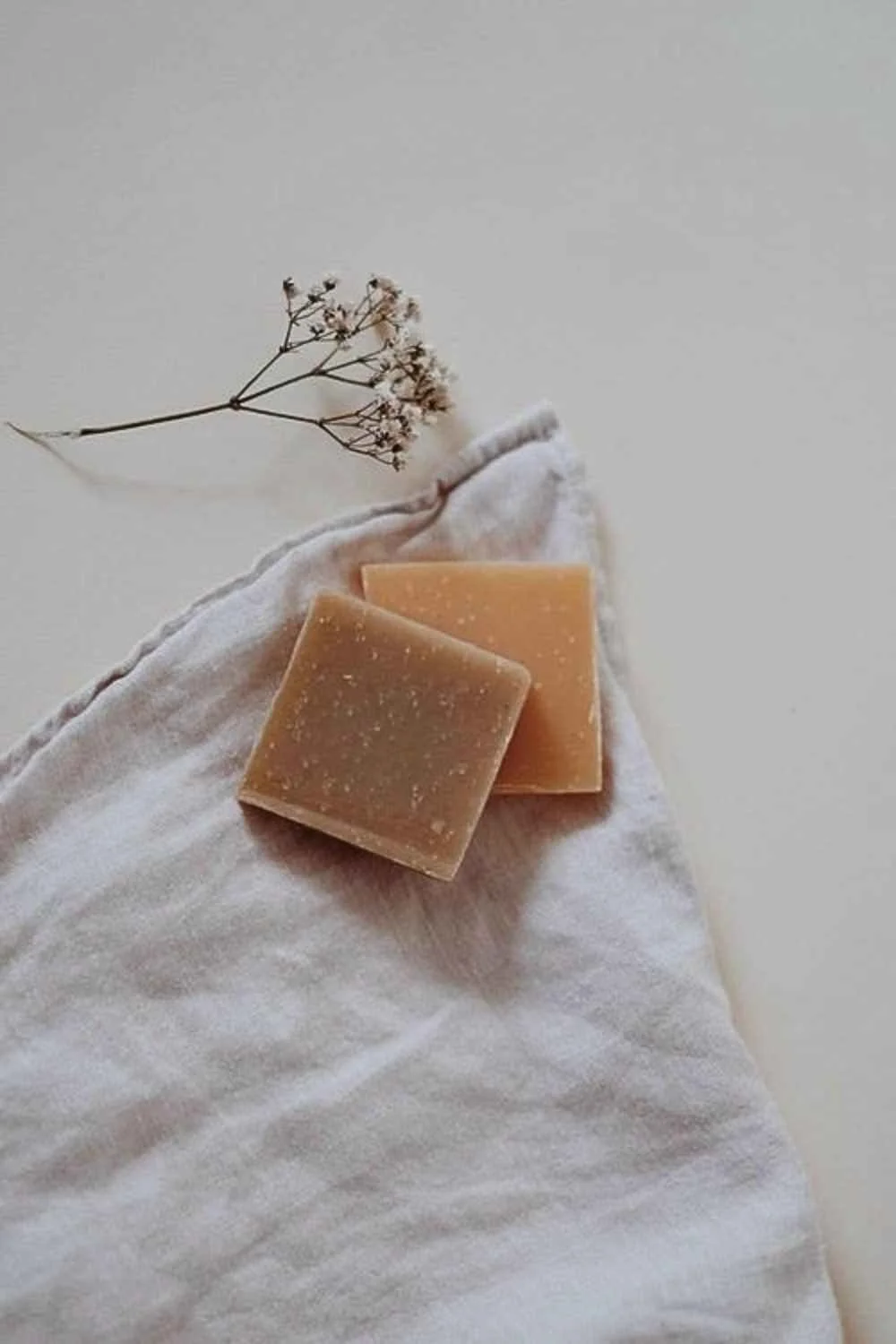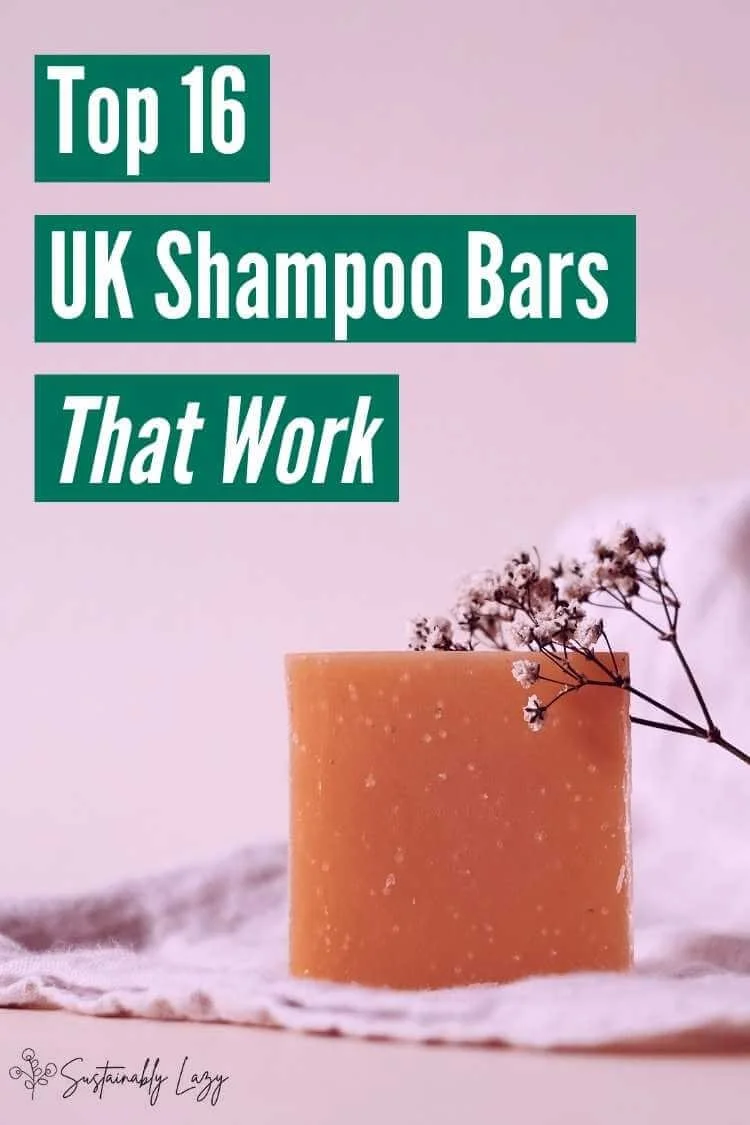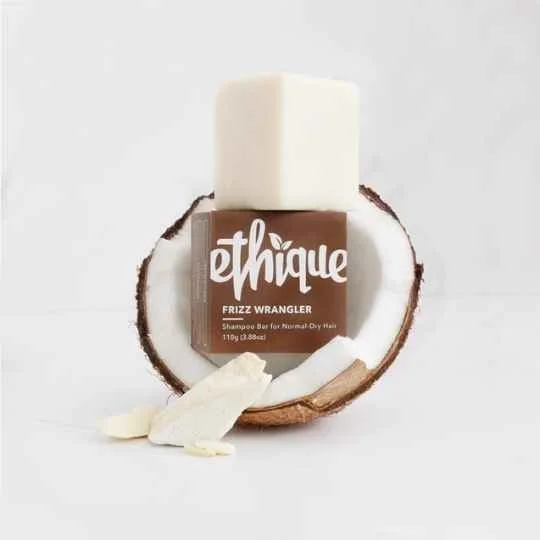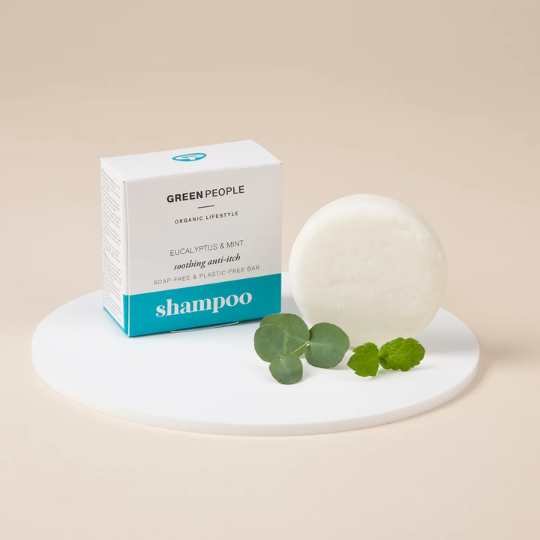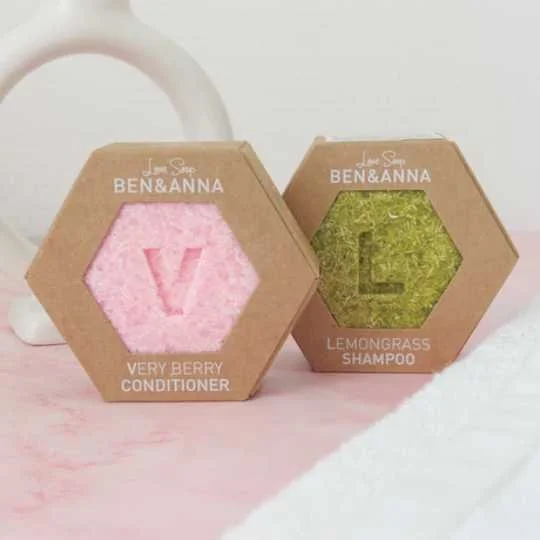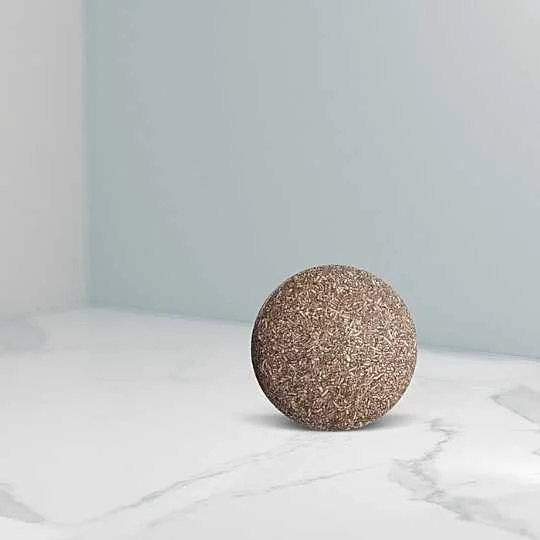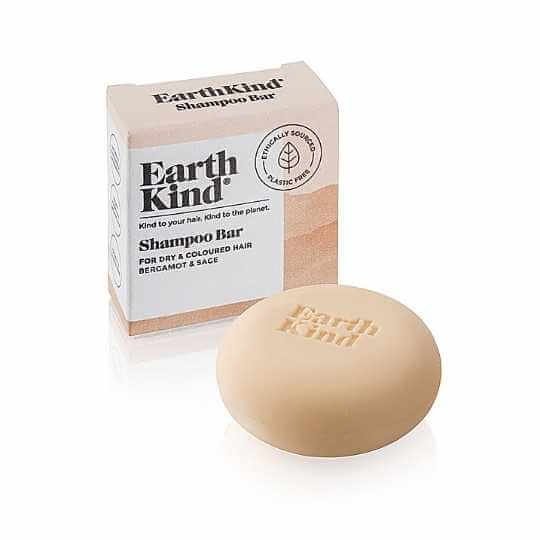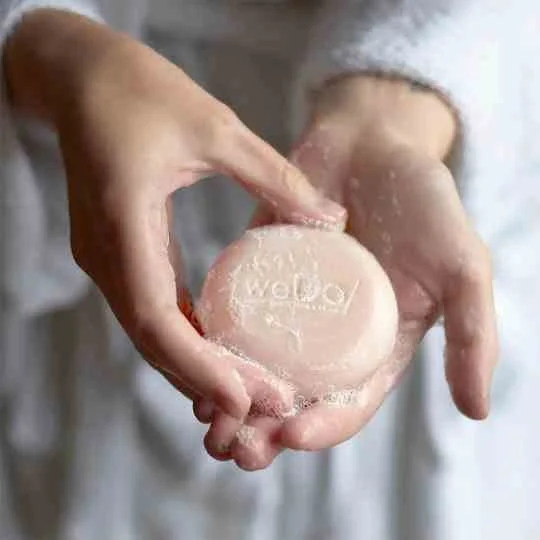13 Best Shampoo Bars For Hard Water In the UK
Are you looking for a shampoo bar that works in a hard water area in the UK? Great news, you’re in the right place. Here are the 13 best bars that actually clean your hair
This page contains affiliate links to sustainable brands
Are you fed up with shampoo bars leaving your hair greasy?
Reducing your plastic waste shouldn’t be hard, but swapping to solid shampoo is a massive struggle for many.
Especially if you live in an area with hard water.
It’s been a few years since I first attempted zero waste hair care
(which was a total disaster by the way).
I don’t want you to have to suffer bad hair as I did so today I’m sharing 13 shampoo bars from the UK that work in hard water areas.
(I have a separate list for the USA).
I have only included “low poo” and “full poo” bars because they work for the majority of people.
If you’re not sure what these abbreviations mean or you want more details on which shampoo bars suit your hair type, check out my other post on which type of shampoo bar is best for your hair.
In today’s blog post, I’m going to share the solid shampoo that I recommend that have no transition phase. I’ll also include short reviews of the bars I have tried, the ingredients and presence of palm oil.
I’m hoping to write reviews for each of them eventually, but this is time-consuming (and frankly quite repetitive).
Sign up for my monthly mailing list if you’d like to be the first to know about plastic-free product reviews.
Coming up
Why does my hair feel waxy after using a shampoo bar?
Can shampoo bars work in hard water?
Are shampoo bars natural?
Hidden palm oil in shampoo bars
Hidden chemicals in synthetic fragrances
List of shampoo bars that work in hard water
[BEST] Most ethical shampoo bars
[BETTER] Shampoo bars with palm oil
1. Why Does my hair feel waxy after using a shampoo bar?
The reason that some bars leave your hair feeling waxy is that they are literally bars of soap.
They are made from saponified oils, which is the technical name for mixing oils (like coconut or olive oil) with an alkali to make soap. It’s obviously much more complex than that but you get the gist.
If you have hard water, the soap molecules bind to the minerals in the water and leave waxy deposits in your hair. Even after washing it multiple times, your hair will look greasy and straw-like.
If you have soft water, mineral build-up shouldn’t be a problem. If you have problems (which you probably will) it’s due to your hair type and the pH of the bar. Soap is alkaline whereas your skin and scalp are acidic.
Basically, regardless of your water type, soap isn’t the best ingredient to take care of your hair for the long term.
I cover this in more detail in my post about transitioning to shampoo bars.
If you’re having problems with waxy hair and you’re using a good shampoo bar, you may want to read why isn’t my shampoo bar working? for help with this.
2. Can shampoo bars work in hard water?
Absolutely, as long as they contain shampoo ingredients and not soap. The best way to know what kind of shampoo bar you’re using is to check the ingredients list.
3. Are shampoo bars natural?
Yes, I would consider most shampoo bars to be a natural product, however, like many natural beauty products there can still be be safe synthetic ingredients present. Let me explain.
"Natural” is short for “naturally derived” and usually refers to:
The origin of the ingredients and if they are plant-based, rather than derivatives of fossil fuels.
Products that don’t have toxic chemicals added to them
“Natural” is not a regulated term, so people have different opinions on it and brands often misuse the word to get people to buy their products.
A well-formulated shampoo bar will contain plant-based surfactants to cleanse the dirt out of hair. Technically, this is not a totally natural ingredient, because it’s been through a chemical process to change it from coconut to a detergent.
However, “natural” soap bars have also gone through a chemical process to become a bar of soap.
Proper shampoo bars may also be referred to as a syndet bars. Syn = synthetic, det = detergent.
Syndet shampoo bars can be made using plant-based surfactants and contain naturally-derived ingredients. They can also be made from SLS derived from petroleum. Natural ingredients can also be harmful to the environment, like palm oil.
Labelling every bar as “syndet” or “natural” without more detailed information doesn’t really help consumers. The best course of action is to look past any labels and focus on individual products and ingredients lists.
Ask brands if they contain surfactants and where the ingredients are sourced from.
Ask them if they use palm oil derivatives and if they trace the supply chain. Oh wait, I’ve done this for you!
4. Hidden Palm oil in shampoo bars
Many of the shampoo bars that work in hard water contain palm oil derivatives.
A derivative is any ingredient that has been processed from palm oil for example, SLS can be derived from palm oil. Roughly 60% of palm oil used is in the form of derivatives.
Palm oil derivatives are commonly found in both solid and liquid shampoo because they are cheaper than their alternatives (coconut oil, olive oil, rapeseed oil).
Unfortunately, it is very hard to trace where the derivatives come from because of long supply chains.
Mass-produced shampoo bar mixtures
DID YOU KNOW: A lot of brands and supermarkets use a generic premade shampoo bar base that contains vegetable oil and surfactants derived from palm oil?
I didn’t, until Sue from KIND2 explained it to me, and since then I can recognise the repetitive formula on ingredients lists.
Many brands, or factories, use the exact same base and add extra oils or fragrances to it before moulding it into the brands chosen shape.
There are also brands that buy premade wholesale shampoo bars containing palm oil and sell them under their brand name.
I find the majority of these brands to have an inadequate palm oil policy. I emailed them all a year ago and nobody replied.
Is palm oil sustainable?
Using palm oil is a complex debate; manufacturers are right that banning or boycotting palm oil would just shift the demand onto another natural resource. But the way I see it is the brands using palm oil are still using these alternatives. For example, there isn’t a single shampoo bar that is coconut-free.
This doesn’t mean palm oil is the best choice though - it is still a cause of widespread deforestation and habitat destruction. While the RSPO is the best certification there is, it was found to have failed to ensure its rules are adhered to.
If you can afford to, the most sustainable option is to choose a shampoo bar brand that has been conscious and transparent about its use of ingredients. Many don’t even tell you their products contain palm oil which is highly irresponsible - even for a small business.
On my list of shampoo bars that work in hard water, I’ve stated whether the brands include palm oil and its derivatives or not. I’m currently working on an investigation into palm oil in shampoo bars. Sign up to my mailing list to be notified when this goes live.
The cost of living
I appreciate that we’re in a cost of living crisis right now and that not everyone can afford the most sustainable options. This isn’t your fault, and it is still better to choose a cheap shampoo bar with palm oil than a single-use plastic bottle full of petrochemical surfactants.
We all have different situations and can only do our best. I just want to help people make an informed choice.
Palm oil hidden names - Polyglyceryl-4 Laurate, glycerine, vegetable oil, stearic acid, all surfactants (the cleansing part) can be sourced from palm oil.
5. Are synthetic fragrances hidden in shampoo bars?
If you’re used to a strong fragrance in your shampoo, you might be wondering why I mention the type of scent used in each bar. While synthetic fragrances, may entice you, they can be a cause for concern.
Toxic chemicals
Many synthetic fragrances are a complex mixture of chemicals, some of which may have harmful effects on our health. These chemicals can be potential allergens, irritants, or even mess with your hormones.
One example is phthalates, which have been linked to a number of health problems, such as reproductive issues, due to their ability to mimic female hormones and suppress male ones. Phthalates can be used as solvents and stabilisers in synthetic fragrances and perfumes.
Fragrances also contain Volatile Organic Compounds (VOCs), a large group of chemicals that emit gas into the air.
Many people are content and okay with synthetic fragrances, but if you have a skin condition, asthma or allergies then I’d personally avoid them and opt for unscented products.
Lack of transparency
One of the main problems with synthetic fragrances is the lack of transparency regarding their ingredients.
Companies are not legally required to disclose the specific chemicals used to create these fragrances (they can simply write “parfum”), which means we often have no idea what we're actually putting on our bodies.
This lack of transparency can be frustrating and worrisome for those of us who prioritise knowing what we're exposed to.
Environmental issues
Another concern is the environmental impact of synthetic fragrances. Many of these fragrances are derived from petrochemicals (fossil fuels), which are non-renewable resources.
The extraction and processing of these chemicals contribute to environmental pollution and carbon emissions, further exacerbating climate change.
Synthetic vs natural fragrances
Brands use synthetic fragrances in their products because consumers are used to and expect a strong scent. As more people become aware of the potentially harmful substances involved, there is a growing movement for “natural” fragrances derived from plants or essential oils.
Natural doesn’t necessarily mean non-toxic, so there are also a lot of people who choose fragrance-free.
To help you make an informed choice, I’ve included which type of fragrance each bar contains.
Tap on the image to pin it to your eco-friendly board on Pinterest:
[Best] most ethical shampoo bars
Edit - this was originally written in 2021 but has been updated in 2023 to update product information, and remove some brands that have sadly closed down.
1. Hairy Jayne
Manufacture: UK (Handmade in Bristol)
Free from palm oil: Yes
Vegan + cruelty-free: Yes
Fragrance: Naturally-derived
Sulfates: Free from sulfates
Cost: £9 for 50g = 2 bottles of shampoo
Review: Hairy Jayne’s plastic-free hair products are all handmade by Jayne - a former hairdresser. The shampoo bar is a little on the small side, but easy enough to hold. I liked this bar a lot, it left my hair feeling clean and fresh. It lathers fine for a sulfate-free bar and was okay with my sensitive scalp. I haven’t tried the conditioner bar that matches it yet, but it’s on my list.
Discount code: use SOPHIE15 for 15% off
2. KIND2
Manufacture: UK
Free from palm oil: Yes
Vegan + cruelty-free: Yes
Fragrance: Naturally-derived or fragrance-free
Sulfates: The Hydrating One and The Sensitive One are sulfate-free. There is some sodium coco sulfate in The Rebalancing One which is designed for oily hair.
Cost: £12.50 for 80g, £6 for sample size 30g
Review: I’ve tried the Sensitive One and the Hydrating One from this bar, along with the conditioner, and they are fantastic. My hair felt clean and soft after using the whole bar. It’s pricey, but the conditioner lasts about 3x as long as the shampoo bar so feels cost-effective in the long run. The newest Rebalancing bar with sodium coco sulfate has multiple surfactants and nourishing oils to ensure hair is fresh and soft after cleaning. Sue told me this is her bestseller if you’re unsure which to try.
Discount code: use SOPHIE15 for 15% off)
3. Ethique
Manufacture: New Zealand (certified carbon neutral)
Free from palm oil: Yes
Vegan + cruelty-free: Yes
Fragrance: Natural / fragrance-free options available
Sulfates: Contains multiple surfactants including a small amount of sodium coco sulfate a non-toxic sulfate that isn’t irritating
Cost: £12 for 110g
Review: Ethique is the brand that helped me fall in love with shampoo bars. They were the first bars that actually washed my hair well. Their conditioner bars are also amazing although they do last quite a lot longer. They have a dozen different bars all formulated for different hair types which I think is great. The downside is they are manufactured far away, which does increase their carbon footprint (although they are Carbon Positive and are stocked in UK stores).
4. Green People
Manufacture: UK
Free from palm oil: TBC (new to list). I’m waiting to find out whether this contains palm oil derivatives, however, Green People’s policy states that any palm oil they use is from certified organic sources in the Philippines or Ecuador (where orangutans don’t live!)
Vegan + cruelty-free: Yes
Fragrance: Natural / fragrance-free option available
Sulfates: Contains multiple surfactants including sodium coco sulfate, a non-toxic sulfate that isn’t irritating
Cost: £16.50 for 50g
Review: If you’re looking for an organic product then Green People is an excellent choice. They prioritise gentle, natural and organic ingredients to create truly skin-friendly products. This is a new addition to my list so I haven’t tried it yet but I can tell from looking at the ingredients list which contains multiple surfactants and beneficial oils to target different needs that it should clean well and leave hair soft and nourished. Please let me know if you try it!
5. Ben and Anna
Manufacture: UK
Free from palm oil: I saw it mentioned online that this is free from palm oil, but I’m emailing to verify this due to the low price
Vegan + cruelty-free: Yes
Fragrance: Natural / fragrance-free option available
Sulfates: Yes, contains sodium coco sulfate, a non-toxic, mild sulfate that is not irritating
Cost: £6.95 for 60g
6. Eco Living
Manufacture: UK
Free from palm oil: Yes
Vegan + cruelty-free: Yes
Fragrance: Synthetic fragrance oil (email confirmation)
Sulfates: Free from sulfates
Cost: £9.45 for 85g
Review: These bars are very popular and highly rated, yet I found the fig bar wasn’t moisturising enough for my “normal” hair type. It’s an ok product with minimal, basic ingredients that left my hair feeling very clean. But by the end of the bar, my hair was a bit dry. It made me wonder if there is a high amount of surfactants in it. I think this would suit oily hair types more as it foams up a lot. All Eco Living bars have the same ingredients with different colours and scents so they don’t cater for specific types of hair.
7. Lavera
Manufacture: Germany
Free from palm oil: Yes
Vegan + cruelty-free: Yes
Fragrance: Naturally-derived
Sulfates: Yes. They use sodium coco sulfate (SCS) which is a non-irritating sulfate
Cost: £10.75 for 50g
Review: Lavera is an ethical brand that produces its own shampoo bars in its own factories in Germany. They are certified Ecocert so you can be certain the product is eco-friendly. I haven’t tried this bar yet, but it contains SCS so it should produce a good amount of lather and leave your hair clean and fresh without any residue.
8. Beauty Kitchen
Manufacture: UK
Free from palm oil: Yes
Vegan + cruelty-free: Yes
Fragrance: Naturally-derived
Sulfates: Yes. They use sodium coco sulfate (SCS) which is a non-irritating sulfate
Cost: £7.99 for 50g
Review: I’ve almost tried this bar so many times but it has happened yet. Mostly because my hair is too dry for products with only SCS. I love Beauty Kitchen’s ethics and adore its skincare range. As the bar contains SCS, it will lather up well and should clean your hair, but it’s not curly girl method approved. I recommend bars like this to people with oily hair that can’t get on with “low poo” bars.
9. grüum
Manufacture: UK
Free from palm oil: Yes (email confirmation)
Vegan + cruelty-free: They are cruelty-free, but one bar isn’t vegan. The Revitalising bar contains lanolin.
Fragrance: Gruum uses synthetic fragrances. They also have a fragrance-free bar that only contains 3 ingredients - shampoo, coconut oil, and water.
Sulfates: Yes, they use sodium coco sulfate (SCS) which is a non-irritating sulfate
Cost: £8 for 50g
Review: Gruum contains minimal ingredients and a high amount of SCS which means it will leave your hair squeaky clean. Make note that while it is cheaper than many others, it is a small bar at 50g. I think this bar will suit people with straight, fine, oily hair as it gives a deep clean. It is also ideal if you have product build-up
[BETTER] Shampoo bars that contain palm oil
The following bars should clean most people’s hair in all types of water. They cost lower than the bars on the “best” list because they use palm oil. If a brand has provided details about the palm oil it uses or shared information about its supply chain (as opposed to just claiming its sustainable with no evidence) then I’ll move it up to my “best” list. I have contacted several of these brands about their palm oil use and have got no response.
10. Faith in Nature
Manufacture: UK
Free from palm oil: No, they use ingredients made from palm oil. They say it is RSPO-certified, but according to the RSPO website, they are not members and I can’t find any public information about their supply chain online. I have emailed them about this - stay tuned!
Vegan + cruelty-free: Yes
Fragrance: Naturally-derived
Sulfates: Free from sulfates
Cost: £7 for 85g
Review: Faith in Nature is a cheaper shampoo bar because it’s made using palm oil. It’s not my favourite shampoo bar, but it does leave my hair clean and soft. It lathers and washes out fine with no residue. It’s more suitable for people on a budget who want clean hair but can’t afford the most ethical bars. I’m currently testing the conditioner bar right now and it’s a bit hit-and-miss so far so I wouldn’t recommend that.
11. Earth Kind
Manufacture: UK
Free from palm oil: No, they use ingredients made from palm oil. I can’t find any evidence of a RSPO membership.
Vegan + cruelty-free: Yes
Fragrance: Natural (shampoo only)
Sulfates: Free from sulfates
Cost: £6.95 for 50g
Review: Another bar that is cheaper because of the use of palm oil. It is also small compared to the other bars on this list. I prefer large bars because they are a bit tricky to use at the end so you get more for your money buying them big. I tried the EarthKind tea tree + eucalyptus bar for improved scalp health as I was struggling with an itchy, flaky scalp at the time. It cleaned my hair well, but I found no improvement in scalp health.
Discount code:
Use AFF10 for 10% off full price products at Bower Collective
Use SUSTAINABLYLAZYCOM for 10% off at Plastic Freedom
12. Wedo
Manufacture: France (email confirmation)
Free from palm oil: No - Their surfactant (Cocamidopropyl Betaine) is derived from coconut or palm oil. Wella became a member of RSPO in June 2022 which is great but they have not yet uploaded any files on their supply chain as proof of sustainable sourcing. View here.
Vegan + cruelty-free: WeDo is certified cruelty-free and vegan but the brand is owned by Wella (who own ghd, Clairol etc), Wella is not cruelty-free.
Fragrance: Synthetic fragrance - manufactured to be low irritation
Sulfates: None
Cost: £15.75 for 80g
Review: WeDo is a new product created by hair professionals and has excellent reviews so far. On LookFantastic, 7 people have said it cleaned their hair well, and 1 person said it left a residue. There are a number of reasons hair might be waxy with a proper shampoo bar, I have a separate post on this. I haven’t tried WeDo yet, and won’t until they improve their palm oil status.
13. Foamie
Allergy note - some products contain almond oil
Manufacture: UK
Free from palm oil: No - Foamie claims they use RSPO-certified palm oil, however, they are not members of the RSPO and I can find no public information about their supply chain online. I have emailed about this but have not yet received a response.
Vegan + cruelty-free: Yes
Fragrance: It looks like they use synthetic fragrance, however, I have not confirmed this yet.
Sulfates: None
Cost: £6.99 for 80g
Review: Foamie is on the cheap side because they use palm oil derivatives. Their bars are unique because they have a string attached so you can hang them to dry in your bathroom - how useful is that? This is ideal for people without space, however, your bar won’t last as long if you leave it hanging in the hot shower so be mindful about location. It needs to dry out and cool down in between uses. I have not tried Foamie’s bar due to unclear palm oil sourcing. They appear to use the same shampoo base for each bar and add a different oil, scent, and colour to each. It should clean most people’s hair, but there are a few mixed reviews on their Facebook page.
Discount code: use &KEEP for 5% off at And Keep
13 Best shampoo bars that work in hard and soft water:
Come across a bar you love? Let me know how you get on.
If you found this helpful, please share it with your friends. You can also support my content by buying me a coffee or following me on Instagram. Thanks for being here - Sophie <3

